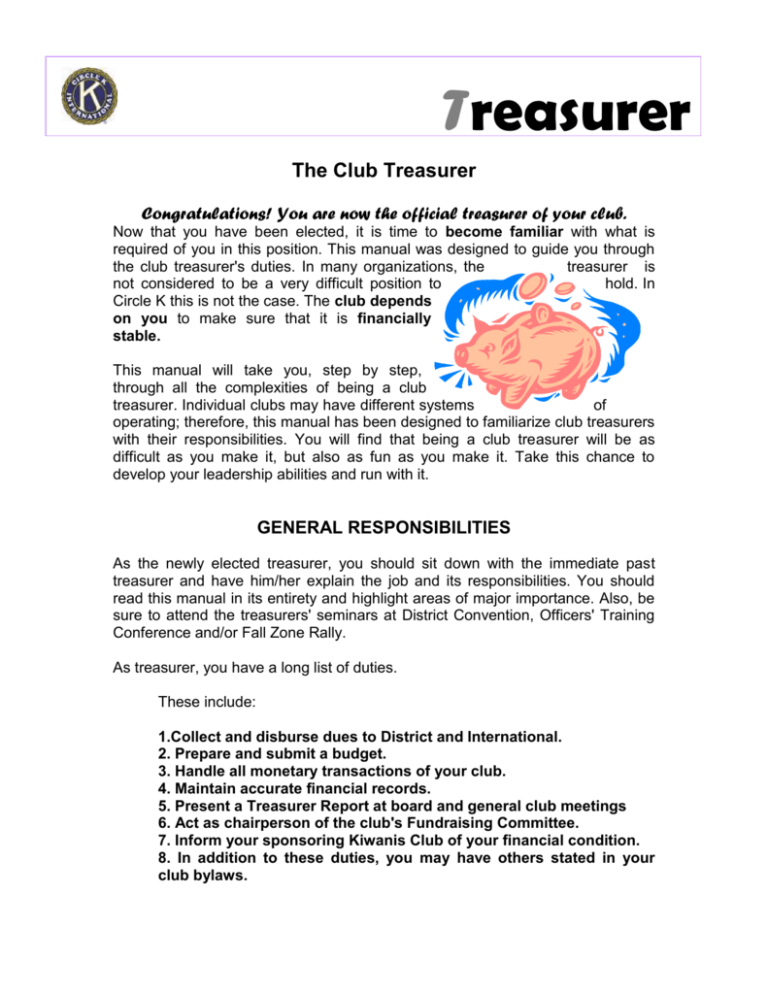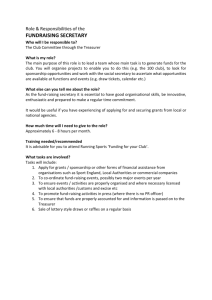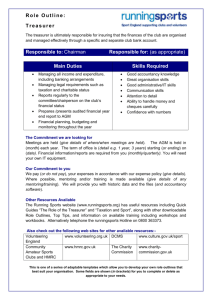Treasurers` Manual - Florida District of CKI
advertisement

Treasurer The Club Treasurer Congratulations! You are now the official treasurer of your club. Now that you have been elected, it is time to become familiar with what is required of you in this position. This manual was designed to guide you through the club treasurer's duties. In many organizations, the treasurer is not considered to be a very difficult position to hold. In Circle K this is not the case. The club depends on you to make sure that it is financially stable. This manual will take you, step by step, through all the complexities of being a club treasurer. Individual clubs may have different systems of operating; therefore, this manual has been designed to familiarize club treasurers with their responsibilities. You will find that being a club treasurer will be as difficult as you make it, but also as fun as you make it. Take this chance to develop your leadership abilities and run with it. GENERAL RESPONSIBILITIES As the newly elected treasurer, you should sit down with the immediate past treasurer and have him/her explain the job and its responsibilities. You should read this manual in its entirety and highlight areas of major importance. Also, be sure to attend the treasurers' seminars at District Convention, Officers' Training Conference and/or Fall Zone Rally. As treasurer, you have a long list of duties. These include: 1.Collect and disburse dues to District and International. 2. Prepare and submit a budget. 3. Handle all monetary transactions of your club. 4. Maintain accurate financial records. 5. Present a Treasurer Report at board and general club meetings 6. Act as chairperson of the club's Fundraising Committee. 7. Inform your sponsoring Kiwanis Club of your financial condition. 8. In addition to these duties, you may have others stated in your club bylaws. DUES Treasurer One of your duties is the timely collection and disbursement of dues. Usually during August or September, you will receive a dues form in an International mailing. This is an NCR form that is used for both District and International Dues. This form should be filled out with correct names and information concerning your new members. If you do not receive this form, contact the District Treasurer or the International Office at 1-800-KIWANIS ext. 123. On October 1st, dues become due for both the District and International. At the beginning of the fall semester, you should at least be able to send in the dues for the officers and returning members. Dues become delinquent as of December 1st. Thus, it is important for you to submit dues on time. After you have submitted the original dues form, as you get new members, send in their dues using the "New Member Add" forms. These can also be obtained from your District Treasurer or the International office. You should always send your club dues by certified mail to ensure their delivery. District Dues: $10 per member and should be sent to: Florida District Treasurer Nicole Quintero (at publication address not available) International Dues: $18 per member and should be sent to: Circle K International 3636 Woodview Trace Indianapolis, IN 46248-3196 International dues help pay the expenses of International officers and the services they provide, such as newsletters, official visits and International mailings. They also pay for your subscription to Circle K magazine. Membership pins, cards and handbooks are also a part of International dues. District dues help defray the cost of the district officers' expenses as well as pay for training manuals, your subscription to Circle Kapers, lieutenant governor newsletters, and the district mailings. If you are not receiving District mailings, call your Lieutenant Governor or District Secretary immediately! Treasurer Getting members to pay their dues is extremely difficult. However, there are plenty of incentives that can ensure paid members by October 1st. Here are some examples: 1. Have a "dues social". To enter, members must pay their dues. 2. "Battle of the Classes". Between the four classes, offer a prize to the class that collects from its members first. 3. Have a club fund-raiser. Those who participate will have a portion of their district and international dues paid from the profits. THE BUDGET Your club should create a budget each year. No matter the size of the club, it is important to have a budget so projects can be well planned and executed. As everyone knows, it takes money to complete many of Circle K's projects. A budget indicates how much a club plans to spend on projects and administrative expenses as well as all projected sources of income necessary to cover these expenses. Before you begin to develop a budget, find out if the club's sponsoring Kiwanis Club is willing to help support the club financially. There may be a Kiwanis club or two that will not go beyond the mandatory sponsorship fee, but usually the Kiwanians are more than willing to help the club they sponsor if the requests are reasonable. The Kiwanians prefer to see a club try to support itself. If your sponsoring Kiwanis club refuses to give your club any monetary support, then the club budget must be balanced through extensive fundraising or expense cuts. Constructing a budget: You do not have to construct a budget by yourself. Your club president, Kiwanis advisor and faculty advisor should all take part in its creation. It is acceptable for general members to be present as well, but it is best to keep the meeting(s) as small as possible to allow for in-depth discussion. Once everyone is assembled, the first thing to do is to make a list of projects and expenditures that your club will have to pay for. These should include expenses for administrative costs (i.e. postage, copies, etc.), project expenses, socials, and conventions. This will allow the Kiwanians to see exactly how the club plans to spend its funds. Next, make a list of all fundraising projects with projected profits and all other sources of income (i.e. student government, club dues, etc.) Finally, calculate the difference between your expenses and your projected income. This difference is what you will ask you Kiwanis club to donate. Keep in mind the Kiwanis fiscal year is from October 1st to September 30th. You should prepare your budget Treasurer early enough to allow your Kiwanis club to incorporate your expenses into their own budgets. Present the budget to the general membership when it is almost completed and ask them to make suggestions. Once the budget is completed, your Board of Directors/Officers and then the general membership must approve it. When this step is completed, the budget can be sent to your Kiwanis club for approval. You should also submit a cover letter explaining the budget. Your Kiwanis advisor is the one who is most likely to present your budget to the Kiwanis Board of Directors. Whoever presents your budget to your Kiwanis club should be prepared to explain and defend it. Normally the Kiwanians will want to discuss these matters without Circle K members present. If they are agreeable, the Kiwanians will grant your request. Remember -- be reasonable and try not to leave any unclear entries. Accounts and Ledgers up your account, some banks may Another important responsibility the treasurer has is to keep the club's financial records through the use of a ledger and an accounting system. Without these it can be very easy to misplace a couple of hundred dollars. In setting up a club accounting system, it is important to have a club checking account. Some clubs even have a savings account as well. If your club does not already have a checking account, here is how you get one. First, shop around and see what different banks have to offer. Many banks offer to waive service charges for non-profit organizations. Ask your Kiwanis club for suggestions. One of their members may be a banker who can help you get your account set up. Try to get an account that will fill your club's needs. Do not pay for services that the club will never use. And if you do have a service charge, remember to include it into your budget! When setting require a copy of the club's minutes to show the names of the club's officers or even a copy of the club's charter (if you do not have one, ask International to send a copy). You should have these items in your possession to make the process easier. It is important to get a checking account that at least three officers or advisors can sign on. This is so that if a check has to be written in a hurry or if the treasurer is unavailable, the club can have access to the funds. Remember, be responsible with this account, and NEVER write checks if there is no money in the account. Checks should not be written without board approval unless it is a certifiable emergency. It is strongly recommended that you choose an account that requires two authorized signatures on the checks. As Circle K members, you should have complete control over your club's funds. Advisors should advise you on club expenditures, but you should have the final decision. Treasurer For explanatory purposes, we will use a six-column ledger with five accounts. The five accounts we will use are Service, Administrative, Socials, Conventions, and Dues. The service account is to Creating an accounting hold money to be used for the system. running of service projects and First, it is a good idea to monies raised for charities. For buy a ledger book to keep the instance, if you have a car wash for club funds organized. A good IDD, the money for your supplies way is to separate the money would come out of the Service in your account into account. Therefore, the money different categories or raised would be put into this account accounts. as well. When your club makes its donation, Some suggested categories: the money will once again be taken Administrative, Service, from this account. The Administrative Dues, Socials, Conventions, account is for expenditures related to and Membership. Other the normal running of the club. These possible categories can include costs for photocopying, include Fundraising or Petty postage, phone calls, and any cash. expenses for committees (i.e. Fundraising, Inter-club, Newsletter, Public Relations, Membership, etc.). The exceptions to this are the Social and Conventions accounts. These may be considered committees, but they warrant their own accounts. The Social account is for any club parties as well as banquets and special events that are considered to be socials. The Convention account is, of course, for conventions. That leaves us with the Dues account. The purpose of the Dues account is to hold the District and International dues as they are collected from the members. This account should read zero through most of the year, and especially just before District Convention. This system lets the club know how its finances are at any particular moment. At the club meetings and board meetings you should get into the habit of not only reading out the total in the checking account, but the amount in each account as well. At first, this may seem cumbersome or confusing, but it will make your life as club treasurer much easier. As you get used to the system, you may want to add to or modify it. Also, during the year, you should have someone to audit your books to make sure everything is okay. Ask a Kiwanian who is an accountant or an accounting professor from your school to look over your books. At a minimum, the club's books should be audited every time there is a change in treasurer so there will be audits at the beginning and end of your term. Treasurer Some clubs are using finances. Programs such as Just make sure to make of transactions just in case disk. Also, for award show a ledger book and So be sure to check the you need to submit. computers to record their Quicken® can be very useful. "hard" copies with each day the computer "eats" the purposes, you will need to other bits of information. award criteria to see what KEEPING ACCURATE RECORDS Receipts: Whenever you receive money for the club from an individual or institution directly, you will have to issue a receipt to that person or institution. For instance, when a member pays their dues, you should give them a receipt. Which means, the club should invest in a receipt book. Make sure to completely fill out the receipt and stub. This will help you later when you enter the credit in the ledger. It will also help the person you gave the receipt to as well. Get into the habit of giving out receipts for monies received. Use your judgment. Obviously, you do not need to give everyone who buys a box of candy at a fund-raiser a receipt. Vouchers: Another duty of the treasurer is to reimburse club members for expenses they incurred for the club. One way to handle this is to have the member turn in the receipt to you, then you will fill out a voucher form and attach the receipt to it. A sample voucher form is included in this manual. No money should be paid out unless the board has approved it. You should file the completed voucher with receipt by month in your files. This will help keep your financial records in order. Project Reports: These are prepared for each club project that involves money. These help the board and future members know what profits and/or expenses were involved with the project. Copies should be made and submitted to the District Treasurer and the club secretary. A sample project report is included in this manual. Treasurer FINALLY... As you can see, the job of treasurer can be a lot of work. If done in an organized manner and with a winning attitude, this could be the most exciting experience of your Circle K career. Just remember -- you are not alone!! It is okay to ask questions. Some of the most important people to stay in touch with are your club's immediate past treasurer, the district treasurer, your president, the lieutenant governor, and advisors. If you follow the guidelines in this manual you will be a great treasurer for your Circle K club. If you have questions about anything in this manual, contact your District Treasurer. GOOD LUCK!! Jennifer A. Chaplain, District Treasurer 1996 wrote this manual, with references from the 1990-1991 Florida District Treasurers' Manual written by William Incatasciato, District Treasurer 1991-1992. The 1999-2000 Edition of this manual was revised and edited by Desirée Hammond, District Treasurer 1998-1999, 1999-2000 with formatting revisions completed in 2001 by MDE Committee Chair, Amy Charpentier.






